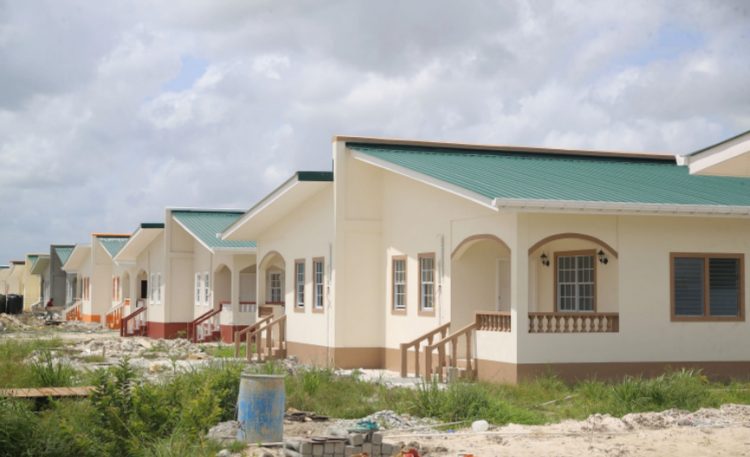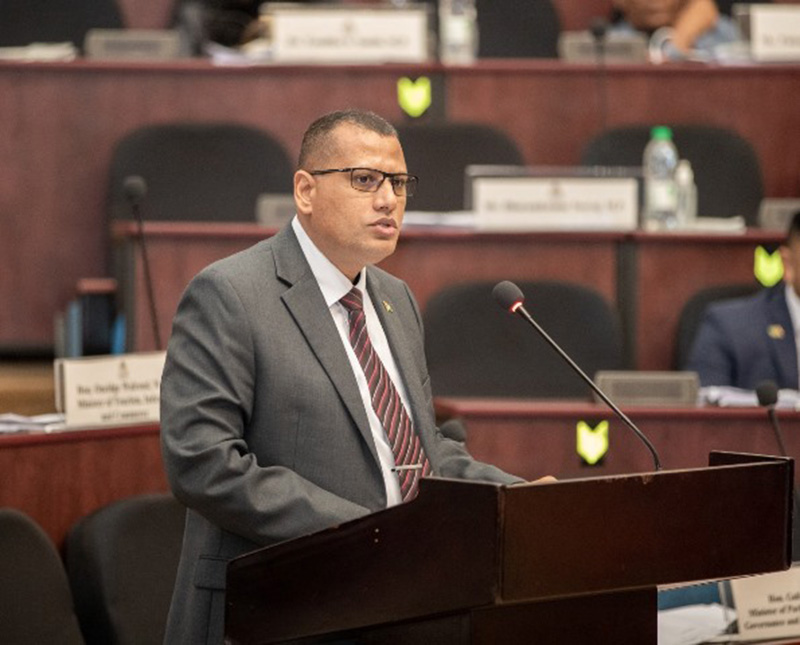Despite calls from the Opposition for the Condominium Bill to be sent to a Special Select Committee, the government remained adamant that the piece of legislation is urgent for the overall development of the housing sector resulting in its passage at yesterday’s sitting of the National Assembly.
The Condominium Bill is aimed at repealing the Condominium (Regulation and Miscellaneous Provisions) Act and was drafted by the Ministry of Housing and Water along with the Attorney General’s Chambers. Darshan Ramdhani and Associates out of Grenada was contracted by the Central Housing and Planning Authority (CH&PA) to lead the initiative.

The Bill was read for the first time in the House in April and according to Minister of Housing and Water Collin Croal, it is aimed at paving the way for persons who purchased duplexes or condominiums from the state to be able to access titles for them as well as providing a regulatory framework for the development of condominium-styled housing in Guyana.
Croal opened the almost four-hour debate on the Bill by talking up the Irfaan Ali administration’s plan for the “holistic” development of housing in Guyana.
“The rapid expansion of Guyana’s economy has brought new demands for higher standards and more modern approaches to housing development that addresses the issue of climate change, rising sea levels, changing lifestyles and growing demands for less expensive units than what the former market offers. These are critical issues that had to be considered as we deliberated on a raft of legislative changes which must be made to the existing legislation to bring it in conformity with a modern legal framework that informs the ownership of condominiums and townhouses,” Croal said.
He added that while condominium developments were pursued as a means of meeting the demands of tourism in most Caribbean countries, it is not the same for Guyana explaining that the Condominium (Regulation and Miscellaneous Provisions) Act of 1989 was enacted to facilitate the sale of condominiums to sitting tenants.
Croal noted that under the 1989 Act the government provided low-cost housing to citizens but was saddled with heavy maintenance costs for the condos which resulted in the sale of the properties for $25,000 in the mid-1990s. The Housing Minister said that the buyers back then were issued with a certificate of sale to be treated as a transport but over time they found it difficult to leverage the certificate as collateral to obtain loans or even acquire insurance.
“This deficiency remains unaddressed for years despite the discomfort it brought on poor citizens,” he said.
He added that the 2017 project by the APNU+AFC administration which saw the construction of almost 50 duplexes in land registry areas, created even more issues for those duplex owners to access titles. The Minister said that the Bill now addresses those issues.
The existing Condominium Act regulates the division of properties into parts that are to be owned individually and parts that are to be owned in common, makes provision for the use and management of such properties, and makes provision for the assignment of certain properties owned by the government, etc, to the tenants thereof, and for matters connected therewith.
It specifies that a “condominium” means any building divided into units, with each unit being attached to, or dependent to a substantial degree on the other units forming the building for support, shelter or easements for passage, or for provision of water, sewerage, drainage, gas, electricity, garbage, artificially heated or cooled air and other services (including telephone).
One of the major issues with the former’s government duplex project relates to the size of the properties on which the duplexes were built, which in some cases fall well below the legally established standard for an individual lot size. Once separated for administrative purposes, each lot is expected to measure a minimum of 40 ft x 80 ft but this is not the case.
“…these duplexes were constructed in areas governed by the Land Registry for which certificates of title were issued. This immediately created a titling issue since the Condominium (Regulation and Miscellaneous Provisions) Act applied only to Deeds Registration areas governed by the Deeds Registry through which transports were issued and therefore a certificate of sale could not be issued under the current land registration system.
“It is clear that the Coalition did not treat this matter with any urgency beyond perhaps talking about bringing new legislation to address the deficiencies in the existing one,” he said.
Croal argued that the Condominium Bill of 2022 addresses the horizontal and vertical subdivision of land and buildings into units for individual ownership and to make
provisions for the use and management of condominiums.
He said that being aware of the need for legislative changes to govern the establishment of condominium schemes, the government embarked on the process by engaging a wide range of stakeholders. Croal informed the House that the stakeholders included the commercial banks, insurance providers and other organizations that made submissions on the Bill.
Too much power
Part One of the Bill addresses the approval and registration of the condominium. Under this part, any person desirous of constructing condominiums or converting existing buildings into units must first submit, to the Minister of Housing and Water, a proposed declaration and description to be approved.
The Minister has the power to approve, deny or amend the declaration and description. A team of experts may be empanelled to conduct a technical review of the declaration and description, after which recommendations are submitted to the minister.
The bill also stipulates stringent timelines within which the minister must act. Within one month of receiving the submission of the documents, the minister shall write to the submitter acknowledging receipt and is required to give notice of his decision no later than three months after he acknowledges the receipt of documents.
…and where the Minister does not, within that period, communicate his decision to the promoter of the condominium in writing, the proposed Declaration and proposed Description shall be deemed to have been approved by the Minister,” the bill states.
Without approval, construction of condominiums cannot commence nor can payments be made or accepted for such.
Once approval is given by the minister, the documents are to be registered and a Corporation is created.
These provisions, however, do not apply to existing condominiums.
The bill states that within six months of the enactment of the bill, the owners of existing condominiums are to prepare declarations for registration. These would not require ministerial approval. Once registration is completed, the owner of the condominium would be issued with a Transport in the case of unregistered land, or a Certificate of Title in the case of registered land.
During his presentation, Opposition Member of Parliament Deonarine Ramsaroop called for the Bill to be sent to a Special Select Committee.
“For decades we have really seen an absence of proper housing and development plan…the intent of the Bill is good as it seeks a transformation of Guyana…this Bill seeks to protect the owners of condos with additional laws to ensure that the procedure is followed but there are several issues and areas that need improvement and Mr Speaker that is why I would recommend that this Bill be sent to a Special Select Committee for further clarification of some of the clauses and probably for the structure and inclusion of some additional clauses,” he said.
The Bill is divided into six parts, with 65 clauses.
Ramsaroop argued that the Bill vests the Minister of Housing and Water with too much power.
“We come to what everyone knows about the government, control and control and control and that is why the context in which this Bill is designed gives too much power to the Minister. Hence, my reason for the Select Committee so that we can set up this framework, context and structure of how the Bill should be properly in place,” he said.
Meanwhile, former Housing Minister Annette Ferguson said that while the Opposition supports the Bill, it should indeed be sent to the committee to iron out issues and answer questions. She said that the Opposition was excluded from the stakeholder consultation prior to the drafting of the Bill.
Additionally, Ferguson said that work on amending the 1989 legislation was started in 2017 but came to a premature end following the passage of the December 2018 motion of no confidence against the APNU+AFC government.
Defending the powers vested with the Minister of Housing and Water by the Condominium Bill of 2022, Minister within the Ministry Susan Rodrigues argued that the Bill promotes the principles of accountability, efficiency and good governance.
“…the Bill imposes two time limits upon the Minister of Housing. First, the Minister has one month to acknowledge, in writing, the receipt of a submission for a proposed Declaration and proposed Description, and second, the Minister has three months from the date of acknowledgment to approve, reject or direct the amendment of a proposed Declaration and proposed Description and requires the minister to communicate, once again in writing, his decision to the promoter of the condominium.
“If the Minister fails to communicate his decision to the promoter within the stipulated period, the proposed Declaration and proposed Description shall be deemed to have been approved by the Minister. Minister’s powers are limited and therefore cannot frustrate an investor by refusing to issue a decision,” she said.
Rodrigues further stated that the Bill promotes transparency since it stipulates that where the Minister rejects a proposed Declaration and proposed Description, he shall furnish the promoter with a written statement of reasons for the refusal.
The junior minister argued that condominiums promote high-density housing which results in the government’s maintenance costs being lower.





